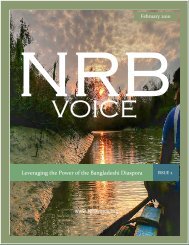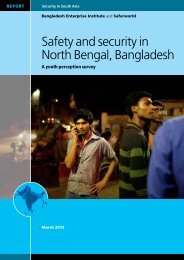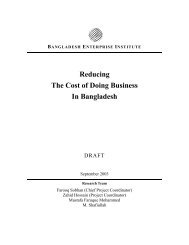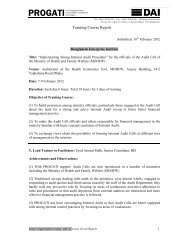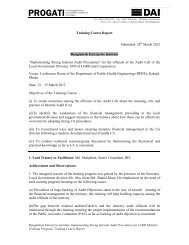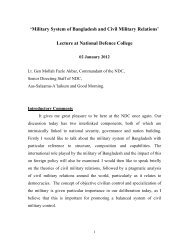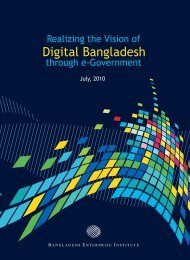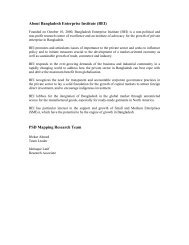Bangladesh Social Enterprise Project - Bangladesh Enterprise Institute
Bangladesh Social Enterprise Project - Bangladesh Enterprise Institute
Bangladesh Social Enterprise Project - Bangladesh Enterprise Institute
You also want an ePaper? Increase the reach of your titles
YUMPU automatically turns print PDFs into web optimized ePapers that Google loves.
its recent expansion. A phenomenological research approach was adopted, and 80 in‐depth<br />
interviews with social entrepreneurs from across the UK identified as the most appropriate<br />
data collection tool. Data analysis sought to identify and understand similarities between<br />
the more understood and studied behaviour of “profit‐seeking” entrepreneurs and those of<br />
an emerging group of social entrepreneurs. In‐depth interviews revealed five key themes<br />
within which the practice of social entrepreneurship could be compared and contrasted<br />
with for‐profit entrepreneurship. These included: the entrepreneurial process, in particular,<br />
opportunity recognition; network embeddedness; the nature of financial risk and profit; the<br />
role of individual versus collective action in managing and structuring enterprises; and<br />
creativity and innovation.<br />
Findings suggest that while the contemporary practices of social enterprises share many<br />
similarities with their for‐profit counterparts, significant differences can be found when<br />
comparing these practices with extant entrepreneurship research. The paper addresses an<br />
emerging phenomenon within the practice and the theory of entrepreneurship and offers<br />
insight into similarities and differences between entrepreneurship in the profit and not‐forprofit<br />
sectors.<br />
Simola, S.K. 2007. ‘The Pragmatics of Care in Sustainable Global <strong>Enterprise</strong>.’ Journal of<br />
Business Ethics. 2007 74:131‐147<br />
This article investigates the implications of an ethic of care for enhancing and facilitating<br />
development for the competencies in a sustainable global enterprise. This article describes<br />
insights for improving the following competencies: facilitating voice, attending to the<br />
subjective experiences of others, engendering trust, and creating win‐win situations.<br />
Recent conceptualizations of sustainable global development have reflected societal<br />
concerns not only with environmental stewardship, but also with social amelioration.<br />
However, the tripartite goals of corporate profitability, environmental protection, and social<br />
responsiveness are unlikely to be achieved through conventional models of globalization.<br />
The emergent approach known as sustainable global enterprise provides a promising



